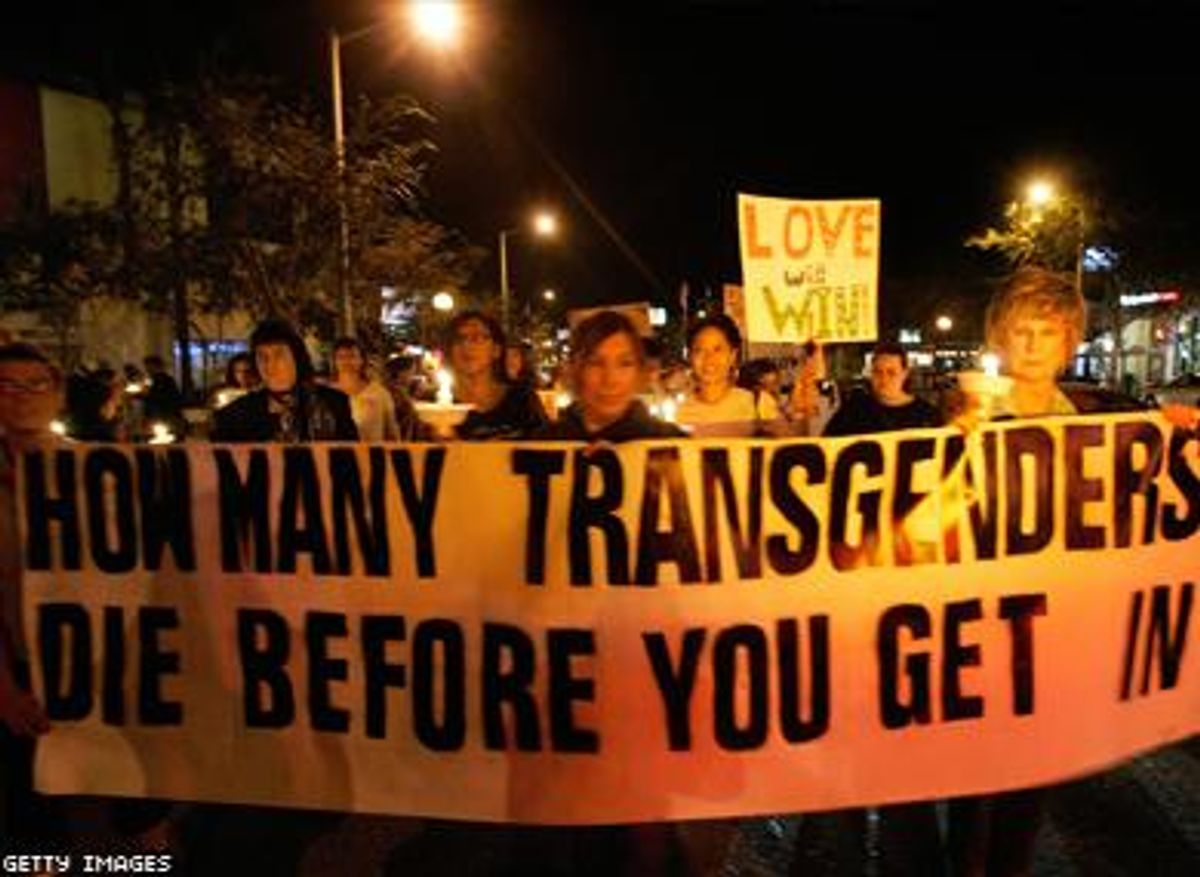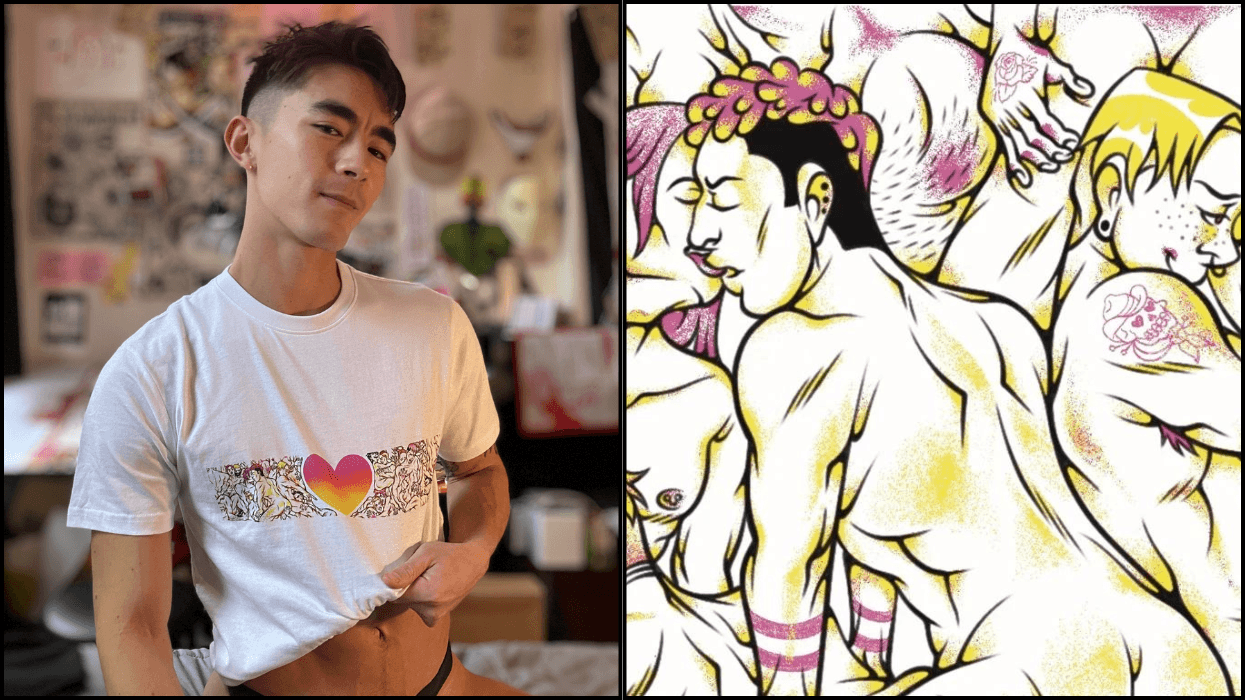Voices
Op-ed: The Somber History of Transgender Day of Remembrance
Op-ed: The Somber History of Transgender Day of Remembrance

By continuing to use our site, you agree to our Private Policy and Terms of Use.
Op-ed: The Somber History of Transgender Day of Remembrance
Op-ed: The Somber History of Transgender Day of Remembrance

A few days ago, I spoke to the gender-neutral housing floor at an Ivy League college about my new transgender memoir. Before introducing me, the faculty adviser wanted to discuss the students' responses to the recent vandalism (a "fag" slur) on their dorm, and a film they watched, the trans movie Gun Hill Road, which this adviser brought to campus only after ensuring that the trans character is not killed.
I keep returning to this act of homophobic harassment and the resistance to promoting the historically dominant, tragic trans narrative as I reflect on the approaching Transgender Day of Remembrance on Sunday.
This is the 13th year the growing community of transgender people and allies commemorates those killed due to antitransgender hatred and prejudice. The history of this day dates back to 1998, when Rita Hester was brutally murdered in her home, and her friend Gwendolyn Ann Smith launched the Remembering Our Dead Web project. The following year, a candlelight vigil for Hester was held, and the date would become the annual Transgender Day of Remembrance.
TDOR persists to raise awareness of hate crimes against trans folk and to publicly mourn those who might otherwise be forgotten. Over 100 international events are listed on the website, along with the names (and occasionally) pictures of those we are memorializing.
In the past couple of years, some activists have brought up concerns over the grave tone and depressing theme. TDOR is the best-known acknowledgment of trans people, and as a trans-questioning person five years ago, the fact that our "special day" focused on violence and murder did little to put me at ease with myself. Almost every trans story I came across focused on pain, tragedy, loss, and suffering. I had to wonder: Is it possible to be a happy, healthy, successful trans person?
While I kept my own process of internal investigation to myself, I observed my transsexual, gender-queer, and gender-nonconforming acquaintances in San Francisco from a distance. Over time, I watched them grow into themselves. I witnessed them finding peace, joy, and expressions of their own unique beauty. These people inspired me to come out, and when I sat down to write my own trans narrative, I consciously decided to highlight the positive aspects of my experience, to focus on empowerment, and to find the humor wherever possible.
Now that I am a happy, healthy, successful trans person (or at least a person working on self-affirmations) invited to speak at a handful of universities as part of their Transgender Awareness Weeks leading up to TDOR, I aim to strike a balance between the somber and the celebratory, to engender hope while also acknowledging the work that still needs to be done.
Over the last decade, more than one person per month has died due to transgender-based hate or prejudice. A groundbreaking report released earlier this year, Injustice at Every Turn: A Report of the National Transgender Discrimination Survey, revealed the extreme challenges that trans people still face.
The statistics are alarming: 63% of participants experienced a serious act of discrimination (i.e., lost job, eviction, physical or sexual assault, bullying, homelessness, denial of medical services), and 23% faced a "catastrophic level of discrimination" -- defined as being impacted by at least three major life-disrupting events. Across the board, trans people of color fared worse than the white participants.
As a trans person of many privileges (class, race, and education) talking to other (mostly) privileged college students this week, I find it important to acknowledge the disparities in what my mind links together: a homophobic act of vandalism and the intention to shift away from the tragic trans narrative at an elite university, and the unabated hate crimes, violence, and discrimination against trans folk, most of whom lack social privileges.
I link these here intentionally, believing our struggles are all linked. While we may separate ourselves under our various social justice causes, our groups and acronyms must join together in the space of our hearts. We all must fight for equality and human rights -- like the right to live -- by backing, recognizing, and honoring each other.
On Sunday we commemorate the loss of our trans folk. I call on everyone in the GLBTQIQA -- buy a vowel, add a letter, become an ally -- to visit the Transgender Day of Remembrance website and review some names and pictures. If you are so inclined, attend a vigil in your area, or simply light a candle in your house. Please take a small moment, even if it is right now, in memory of those in our community, this great big community of humanity, who have been killed in the past year for being themselves.
Then take a breath and move forward; continue your activism by living honestly and authentically. In honoring our own lives, we remember the dead, something we will continue to do annually until our collective tragic trans narrative is obsolete.
A native of New York, Nick Krieger realized at the age of 21 that he'd been born on the wrong coast, a malady he corrected by transitioning to San Francisco. His writing has earned several travel-writing awards, has been published in multiple travel guides, and has appeared in numerous outlets including 365Gay, Original Plumbing, Velvetpark, The Rumpus, The New Gay, and Curve. His new book, Nina Here Nor There, is a gender-bending exploration of the land between man and woman, a coming-of-age story, a family dramedy, and a tale of first love. A personal journey filled with candor and humor, this memoir brings readers into the world of the next generation of transgender warriors.
Want more breaking equality news & trending entertainment stories?
Check out our NEW 24/7 streaming service: the Advocate Channel!
Download the Advocate Channel App for your mobile phone and your favorite streaming device!

